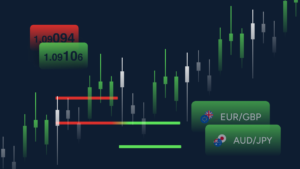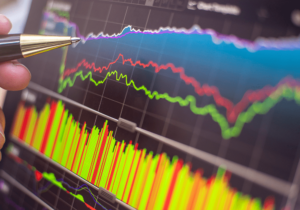Trading is always a psychological see-saw, especially when volatility suddenly appears in the market. It’s only natural to be swept into FOMO when you dive into the market quickly or allow fear to prompt you out of positions when you probably shouldn’t leave. Emotional discipline gives you self-control—not to make irrational decisions based on temporary emotional urges—but so each trade finds its basis in substantial reason and strategy.
Helps You Stick to Your Plan
One of the most important components of successful trading is having a plan that clearly outlines entry and exit points, risk/reward ratio, and the size of positions. Emotional discipline enables you to stick to that plan when your emotions scream to go in another direction. It ensures you cannot divert from your trading rules during periods of market turbulence, allowing you to stay consistent and avoid blowing your account.
Reduces Overtrading
Overtrading is one of the biggest emotional pitfalls for traders. It’s tempting to trade constantly, especially after a few wins or losses. However, excessive trading often leads to mistakes and increased risk exposure. Emotional discipline helps you recognize when it’s time to step back, allowing you to maintain a balanced approach to your trading.
Reduces Stress and Anxiety
If you’re an emotionally driven person, the ups and downs of trading can easily get on top of you. Stress and anxiety blur your judgment and lead to impulsive decisions. By being emotionally disciplined, you’ll be able to approach trading in a cool-headed manner, reducing the emotional rollercoaster that may come with market fluctuations.

How to Cultivate Emotional Discipline in Trading?
Create a Comprehensive Trading Plan
It is much easier to work your way through emotional discipline when you start with a clearly defined, well-set trading plan. Your plan should include:
- Entry and exit points based on your analysis—technical or fundamental
- Risk management rules: stop-loss orders, position sizing, risk-reward ratios
- Trading objectives for short- and long-term success
A structured plan keeps your emotions under control because it provides a basis for logical decisions instead of whims.
Apply Risk Management Techniques
Emotional discipline will come from including risk management tools in your strategy, such as stop-loss orders, position sizing, and the risk-reward ratio. By knowing how much you’re willing to lose with each trade and by setting boundaries, you can stay calm during adverse market movements. Protecting your capital means you are not overreacting to market fluctuations, keeping your emotions in check.
Accept Losses as Part of the Process
Even the best traders incur losses. Accepting the fact that losses are inevitable cushions you from emotional attachment to individual trades. Never “revenge trade” when you incur losses. Re-strategize, learn from your mistakes, and move on. This helps cultivate a healthy mindset toward losses and promotes emotional stability.
Practice Mindfulness and Stress-Relief
Emotions often flow from stress, so you need to take care of your mental well-being outside of trading hours. Practices like mindfulness, deep breathing, or even physical exercises will help you stay focused and composed when making trading decisions. Regular breaks and time for hobbies away from trading will also help you avoid burnout and maintain a balanced perspective.
Stay Detached from Market Noise
Continuous monitoring of market news and social media may cause emotional confusion, leading to FOMO or hastily made decisions. Try not to get overwhelmed by external influences. Stick with your analysis and trust your strategy. Learning to stay detached from the “noise” helps you focus on your goals without unnecessary distractions.

Common Emotional Mistakes to Avoid While Trading!
Fear of Missing Out (FOMO)
FOMO is a hazardous emotion in trading. It drives you to enter trades when the analysis isn’t right or before the setup appears. Always stay with your trading plan and never rush into a trade because others are doing so.
Greed
One of the most dangerous emotions that completely destroy traders is greed. After a few profitable trades, making more may blind you to sound judgment. Many fall into over-leveraging their positions, making unnecessary risks, or just holding on to one position for too long. Stick within your risk-reward ratio and don’t chase profits beyond your planned limits.
Overreacting to Losses
It’s human to feel dejected after a loss, but the emotional reaction can lead to rash decisions. Never let a loss dictate your trading. Stay disciplined, take losses as learning opportunities, and stick to your long-term strategy.
Overconfidence
Overconfidence may be lurking after a few successful trades. The feeling of invincibility or that the market will always go in your favor can lead to disastrous decisions and losses. Stay humble, and continuously evaluate your trading strategies.
Conclusion
Emotional discipline is probably the most critical area every trader should develop. It helps you stick with your trading plan, reduce the emotional toll of the markets, and maintain consistency over time. Once you have a clear trading strategy, take care of appropriate risk management, accept losses, and control your emotions, trading becomes less stressful and more methodical.
Successful trading isn’t about avoiding emotions altogether but learning to manage them effectively. Keep your emotions in check, stay disciplined, and you’ll increase your chances of long-term profitability.
Unlock global markets through our advanced trading solutions.
Table Of Content
Recent Posts
- Top 10 Commodities

- Top 5 Forex Trading Strategies for Consistent Profits in 2025 (All You Need to Know)

- Day Trading vs. Position Trading in Commodities: Which Strategy Works?

- Best Crypto Trading Strategy in 2025: Learn How to Trade Cryptocurrency in 5 Easy Steps!

- The Role of Technical Indicators in Trading: Enhancing Your Analysis


